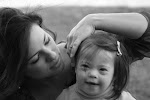



Each month, I write an update for Bridget's Early Intervention team to let them know what skills she has acquired and what we are working on with her at home. We use the write-up as a starting point for our meetings. The updates have also been a great way to document Bridget's development and progress. Here's the latest one:
___________________________________________
Bridget is walking well now. She’s making significant progress (all areas) and is attempting more spoken words and enjoying independent play. She loves purses, phones, sunglasses, bubbles and tea parties. She’s discovered that she can climb (out of her crib and elsewhere!)
- Even more “jabbering” with new sounds like “ka” and “tsss”. New words: “eat eat eat!”, “cup”, “yogur” or “gogur” (yogurt), says “dahl” while signing “ball”, says “sauce” while signing apple (how about that!), “day day” (birthday). Bridget often points to her mouth when she says a word, which is what I do when I want her to “watch my mouth”. New signs: beach, dolphin, potty
- Walking (everywhere!). Walks around house without falling, is starting to pay attention to obstacles. Can walk on grass. Is beginning to “kick” (which she also tries to say). She can walk and drink from her cup at the same time :)
- Takes off shirt, pants, socks, shoes
- Recognizes many body parts: head, hair, eyes, mouth, lips, teeth, tongue, nose, shoulders, arms, hands, fingers, feet, toes. Says “heh” (head), “hair”, “tee” (teeth), “no” (nose), “toe” (toes)
- Sits on the potty and says “tssss” (then gets up and claps). We are just beginning potty training with her :)
- Blows kisses to say “I love you”
- Can now put sunglasses on the “right way” and adjusts them, also wears them on her head
- Helps mommy get ready and knows what each thing on my vanity is for (i.e., eyedrops, lotion, lipgloss, etc.)
- Has learned how to fake sneeze (and it sounds real…"ah choo!")
- Is using a spoon fairly well to eat applesauce, oatmeal, yogurt
- Working on walking and balance (marching—which right now is stepping back and forth—, tiptoes, kicking, “up & down”)
- Doing lots of oral-motor exercises: Blowing feathers, blowing bubbles in milk or in the bath, sipping through straws, licking frosting off lips, etc.
- Beginning to transition from sippy cups to drinking from a straw or open cup
- Still working on chewing and tongue lateralization. We continue to focus on independent eating strategies. We are encouraging Bridget to use a fork and spoon. She does not want to use a fork and throws it as soon as we give it to her…UGH!
- Working on taking turns, making choices
- Singing, dancing, reading, pretending with Bridget
- Playing outside
- Fine motor: drawing with crayons and with her Aquadoodle, playing with play-doh, pushing buttons on toys
- “Playing with” puzzles
- Having Bridget point things out in books
- Singing, reading, talking about animals and the sounds they make
- Counting 1-10 (books, flashcards, manipulatives)
- Singing and word plays: Head, Shoulders, Knees and Toes, You are my Sunshine, If You’re Happy and You Know it, Pat-a-cake
- Using some signs with her, and also still really encouraging Bridget to speak—especially with a mirror for reinforcement and through singing (she will repeat sounds when we sing them)
*I found a few items recently that others might also be looking for:
tiny underwear at TheChildren's Place and
these take-n-toss flip lid cups (which I got at Target, and should help with the transition to drinking from a straw
or open cup--you can use them either way).
















